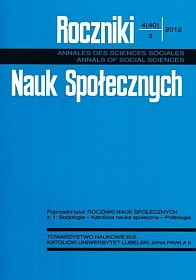Personalizacja rywalizacji wyborczej w kampanii parlamentarnej
Abstrakt
This paper focuses on the way in which the Polish general elections of 2011 was reported upon by the two most popular dailies in the Wielkopolska region: „Głos Wielkopolski” (henceforth as PWG) and „Gazeta Wyborcza - Poznań” (henceforth as GW). Both these titles are regional editions of the general, nation-wide titles: „Polska the Times” and „Gazeta Wyborcza”, respectively. Their popularity among the readers is almost identical, with a slight advantage on the former title’s part.
The role of the local press in the political debate resembles the general role of the media in society. At the same time, the issues discussed locally should be different from those crucial for the more general, nation-wide arena. The election time is a vital social issue and it seems reasonable to expect the elections to attract comments by the press. However, our analysis of the materials in “PGW" and “GW” shows that neither of the editorial teams did highlight the elections to extend the level of a mere informational duty. The journalists did not show extensive engagement in the conduct of the campaign, and did not depart much from the routine way of commenting on the daily life of the local community. In the era where politics and media are more and more interdependent, and where the politics permeating media is less and less tolerated by the citizens, the elections cease to be a period of an intensified exchange of information between the participants of the political communication process. Instead, the elections become a more and more routine socio-cultural ritual that can only produce a limited extent of public excitement.
Bibliografia
Bauman Z.: Zindywidualizowane społeczeństwo, Gdańsk: GWP 2008.
Blumler J. G., Kavanagh D.: The Third Age of Political Communication. Influences and Features, “Political Communication” 16(1999), s. 209-230.
Blumler J. G., Gurevitch M.: Rethinking the Study of Political Communication, w: Mass media and society, eds. J. Curran, M. Gurevitch, London: Arnold 2000, s. 155-172.
Driessens O., Raeymaeckers K., Verstraeten H., Vandenbussche S.: Personalization according to Politicians: A practice theoretical analysis of mediatization, “Communications” 30(2010), s. 309-326.
Kaczyński J.: Polska naszych marzeń, Lublin: Akapit 2011.
Karvonen L.: The Personalization of Politics. What does research tell us so far, and what further research is in order? Paper prepared for the 4th ECPR Conference, Pisa 6-8 September 2007.
Kinder D. R.: Komunikacja i polityka w epoce informacji, w: Psychologia polityczna, red. D.O. Sears, L. Huddy, R. Jervis, Kraków: Wyd. UJ 2008, s. 325-357.
Kinder D. R.: Presidential Character Revisited, w: Political Cognition, eds. R.R. Lau, D.O. Sears, Hillsdale: Lawrence Erlbaum, Inc. 1986, s. 233-255.
McAllister I.: The Personalization of Politics, w: The Oxford Handbook of Political Behavior, eds. R.J. Dalton, H-D. Klingemann, Oxford: Oxford University Press, 2007, s. 571-589.
McGraw K. M.: Wizerunki polityczne: tworzenie i sterowanie, w: Psychologia polityczna, red. D.O. Sears, L. Huddy, R. Jervis, Kraków: Wyd. UJ 2008. .
Newman B. I.: The Marketing of the President. Political Marketing as Campaign Strategy. London: SAGE, 1994.
Opinie i diagnozy nr 21, Wybory 2011 w badaniach CBOS, Warszawa 2011.
Piontek D.: Komunikowanie polityczne i kultura popularna. Tabloidyzacja informacji o polityce, Poznań: Wyd. WNPiD 2011.
Stanyer J.: Modern Political Communication. Mediated Politics In Uncertain Times, Cambridge: Polity Press 2007.
Strömbäck J.: Four Phases of Mediatization: An Analysis the Mediatization of Politics, “Press/Politics” 13(2008), s. 228-246.
Turner G.: Understanding Celebrity, London: SAGE 2004.
Van Santen R., Van Zoonen L.: Popularization and personalization in Political Communication. A Conceptual Analysis. Conference Papers, ICA, 2009 Annual Meeting, s. 1-38.
Copyright (c) 2012 Roczniki Nauk Społecznych

Utwór dostępny jest na licencji Creative Commons Uznanie autorstwa – Użycie niekomercyjne – Bez utworów zależnych 4.0 Międzynarodowe.


